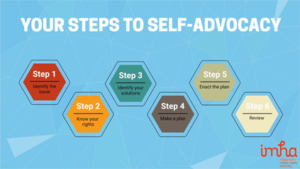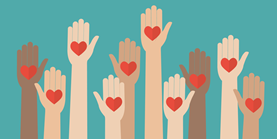Blog
Healthcare Advocacy and Self Advocacy
- April 28, 2021
- Posted by: Healthy Young NV
- Category: Teen Young Adult

Understanding what healthcare advocacy is and how to advocate for yourself (self-advocacy) or others in a healthcare setting are important when it comes to maintaining and improving a state of health and wellbeing. Both healthcare advocacy and self-advocacy involve health literacy. Health literacy means that one is able to understand healthcare information, make informed healthcare decisions, and knows how to navigate the healthcare system. Below is a quick guide to health literacy, health advocacy, and self-advocacy.
Health Literacy
There are different kinds of health literacy – personal health literacy and organizational health literacy. According to the CDC, personal health literacy “is the degree to which individuals have the ability to find, understand, and use information and services to inform health-related decisions and actions for themselves and others.” This means that individuals are not only able to understand health information, but that they can also utilize that health information to make good healthcare decisions. When it comes to organization health literacy, this term is defined as “the degree to which organizations equitably enable individuals to find, understand, and use information and services to inform health-related decisions and actions for themselves and others.” It is important that organizations work to actively improve health literacy in the populations they serve – health literacy is a two-way street and responsibility does not solely fall on those seeking out healthcare services. In fact, there has been significant discussion on what makes a healthcare organization health literate. Unfortunately, not all healthcare organizations make improved health literacy a priority. This is when personal health literacy becomes especially important, which includes doing your own research, asking the right questions, bringing a trusted person with you, knowing you have a right to request an interpreter, and more.
Health Advocacy and Self Advocacy
A lot of the steps to improve your personal health literacy involve health advocacy. Similar to health literacy, health advocacy involves understanding healthcare systems, making them easier to navigate, and ensuring improved access to quality care. Health advocacy also involves a two-way street where both patient and provider are trying to better understand each other and communicate information. The term “health advocacy” can refer to larger scale organizational changes – this is known as systems advocacy. There is also individual advocacy, which can involve a healthcare advocate assisting a patient. Then there is self advocacy – this involves knowing your healthcare rights, needs, and wants – in addition to being able to effectively communicate those to your doctor. Self advocacy “means understanding your strengths and needs, identifying your personal goals, knowing your legal rights and responsibilities, and communicating these to others.” Being able to effectively self-advocate involves the following:
Health Advocates
As discussed above, a health advocate falls under the scope of individual advocacy and is “an individual who provides direct and personalized services to a patient and/or their family as they navigate the healthcare system.” They can “also engage in activities that promote health and access to health care in communities and the larger public.” Health advocates are supposed to assist and educate patients and/or their families throughout the process of seeking care to ensure that they receive the highest quality of care possible. While some health advocates are professionals, some can be a friend, family member, or caregiver. Regardless of who it is, it is important to choose a health advocate that is trusted, capable of navigating the healthcare system, and who takes an active role in caring about your health and wellbeing. Sometimes health advocates are hired, and sometimes resources like the National Association of Healthcare Advocacy (NAHAC) can be used to find one.
Health advocacy is vital to healthy communities. This goes hand-in-hand with health literacy, which involves organizational responsibility and personal responsibility. Like health literacy, health advocacy efforts require action both from providers as well as individuals to help better improve the quality of care that each person receives, as well as how empowered they feel about their own health and wellbeing.
Having health literacy and health advocacy are both important in a healthcare setting – we as individuals need to be our own self-advocates to be able to take charge of our health, and use these skills to talk to our doctor about any health concerns one might have. This is especially important as you become an adult and start to make your own doctor’s appointments. Providers are your trusted resource for health, so it is so important to be able to advocate for your own health when visiting your doctor.
Resources
Health Literacy
Health Literate Healthcare Organizations
Health Advocacy
Types of Advocacy
Self Advocacy Toolkit
About Health Advocacy
The Power of a Healthcare Advocate
NAHAC
This blog post was written for Healthy Young NV by Lauren, a High Sierra AHEC Student Ambassador. Lauren is currently studying Microbiology & Immunology at the University of Nevada, Reno; she will also graduate with a minor in Philosophy.
Follow the links for credit to individual images: advocacy, raised hands, self advocacy, & health advocacy.



